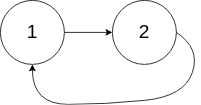142、Linked List Cycle II
Given a linked list, return the node where the cycle begins. If there is no cycle, return null.
To represent a cycle in the given linked list, we use an integer pos which represents the position (0-indexed) in the linked list where tail connects to. If pos is -1, then there is no cycle in the linked list.
Note: Do not modify the linked list.
Example 1:
Input: head = [3,2,0,-4], pos = 1
Output: tail connects to node index 1
Explanation: There is a cycle in the linked list, where tail connects to the second node.

Example 2:
Input: head = [1,2], pos = 0
Output: tail connects to node index 0
Explanation: There is a cycle in the linked list, where tail connects to the first node.

Example 3:
Input: head = [1], pos = -1
Output: no cycle
Explanation: There is no cycle in the linked list.

Follow up: Can you solve it without using extra space?
思路
先判断是否有环
有环:slow节点从头开始遍历,fast节点从而且相遇的地方开始遍历,等到相遇的节点即为相遇点。
无还:返回NULL
c++11
/**
* Definition for singly-linked list.
* struct ListNode {
* int val;
* ListNode *next;
* ListNode(int x) : val(x), next(NULL) {}
* };
*/
class Solution {
public:
ListNode *detectCycle(ListNode *head) {
ListNode *slow = head, *fast = head;
while (fast && fast->next) {
slow = slow->next;
fast = fast->next->next;
if (slow == fast) {
slow = head;
while (slow != fast) {
slow = slow->next;
fast = fast->next;
}
break;
}
}
if (!fast || !fast->next) return NULL;
else return fast;
}
};
ac结果:
Runtime: 20 ms, faster than 30.50% of C++ online submissions for Linked List Cycle II.
Memory Usage: 9.7 MB, less than 63.00% of C++ online submissions for Linked List Cycle II.